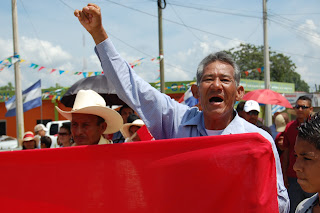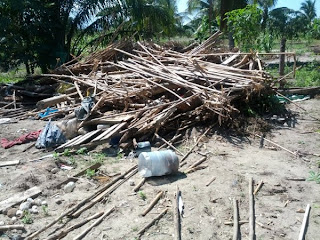el español original sigue el ingles.
December 31, 2014 1:01pm, Alert! Illegal Violent Eviction of the Campesino Group “Camino al Futuro” - National Center for Rural Workers (CNTC)
 More than 17 families from the Campesino Enterprise Camino al Futuro (Path towards the Future) in the sector of Las Maderas, San Jeronimo, Comayagua are the object of a brutal eviction that began in the early morning.
More than 17 families from the Campesino Enterprise Camino al Futuro (Path towards the Future) in the sector of Las Maderas, San Jeronimo, Comayagua are the object of a brutal eviction that began in the early morning.
In the early morning yesterday (December 30) and today (December 31) families belonging to this campesino group fled to the mountains in this area in order to protect their physical well-being, as they were being chased by persons dressed in military clothing wearing ski masks and firing live ammunition.
The families are left with nowhere to live because their houses and their crops of corn, rice and beans are being set on fire, according to the declaration by the president of the campesino group Ninfa Rosa Medina.
There are around 240 manzanas of land claimed by the Maradiaga Family which according to Medina did not have titles to the property just six months ago, “they have gotten them (titles) illegally since the National Agrarian Institute (INA) already declared these lands to be forest land” stated Medina.
The campesino group has been in procession of the land for 6 years and at this time are in negotiations with the government of Honduras to obtain the titles to the land from the Institute of Forest Conservation (ICF) and the INA.
“We condemn this illegal act of theft and we call on the organizations of defenders of Human Rights to be present in the zone to protect the lives of these campesino families, we condemn the brutality to which our compañeros are being subjected and we ask the authorities in the area to be vigilant about the physical well-being of the the compañeros” stated the general Secretary of the CNTC, Franklin Almendares
Please share this information
Central Nacional de los Trabajadores del Campo-CNTC
dic 31 01:01 PM - CNTC: ALERTA SE EJECUTA DESALOJO ILEGAL AL GRUPO CAMPESINO CAMINO AL FUTURO
Mas de 17 familias de la Empresa Campesina Camino al Futuro ubicados en
el sector de Las Maderas, San Jeronimo, Comayagua, Estan siendo objeto
desde la madrugada de este día de un brutal desalojo.
Esta empresa campesina es afiliada a la Central Nacional de Trabajadores
del Campo ( CNTC).
En horas de la madrugada desde el día de ayer 30 y hoy 31 de diciembre
las familias pertenecientes a este grupo campesino huyen guardando su
integridad física en las montañas de este sector, ya que son perseguidos
por personas vestidas con vestimenta militar y pasamontañas quienes les
disparan a bala viva.
Estas familias están quedando sin un lugar donde vivir porque sus casas
y los cultivos de Maíz, arroz y frijoles están siendo quemados, según
la denuncia emitida por la presidenta de la empresa campesina Ninfa Rosa
Medina.
Son alrededor de 240 manzanas de tierra q exigen ser liberadas por parte
de la Familia Maradiaga, quienes según Medina no tenían títulos de
propiedad hasta hace unos 6 meses atras, "los han conseguido de manera
ilegal, ya que el Instituto Nacional Agrario (INA) declaro estas tierras
areas forestales" aseguro Medina.
El grupo campesino tiene 6 años en posesión de estas tierras, y
actualmente se encuentran en negociación con el estado de Honduras para
obtener la titularidad de las mismas con el Instituto de Conservación
Forestal (ICF) y el INA.
"Condenamos este acto ilegal de despojo y hacemos un llamado a los
organismos defensores de Derechos Humanos a hacerse presentes a la zona
y proteger las vidas de estas familias campesinas, condenamos la
brutalidad de que son objeto nuestros compañeros y pedimos a las
autoridades de la zona vigilar la integridad fisica de los compañeros"
dijo el Secretario General de la CNTC Franklin Almendarez.
Favor compartir esta denuncia
Central Nacional de los Trabajadores del Campo - CNTC

















































